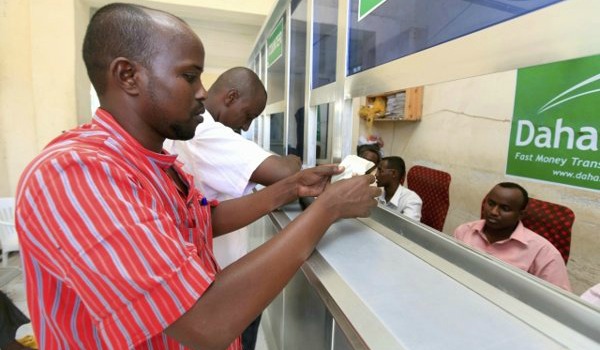Somalia’s remittance industry and the millions of Somalis it serves are awaiting word from Britain’s high court, where a judge is expected at any time to rule on an injunction sought by Dahabshiil, Somalia’s biggest remittance company, to prevent Barclays Bank from carrying out its decision to close its account.
Dahabshiil effectively is the last man standing among Somalia’s money transfer operators after it managed to get an extension to Barclays’ closure deadlines.
Barclays, Britain’s second largest bank by assets and the last major bank providing remittance services in Somalia, agreed to continue to keep Dahabshiil’s account open until after the high court’s verdict.
In May, Barclays announced its intention to close the accounts of about 250 money-service businesses on the grounds that some of them, including some remittance companies, did not have the necessary systems in place to spot criminal activity with the degree of confidence required by Barclays’ regulatory environment.
In an official statement published on its website on Sept. 30, Barclays attributed its “immediate action” against the money service accounts to recent reports highlighting where the sector has been used as a conduit for financial crime, including terrorist financing.
“In their recently published Annual Financial Crime Report, our regulator, the Financial Conduct Authority, drew attention to the heightened money laundering risks, with the sector ‘being at particularly high risk of abuse by those seeking to launder money or finance terrorism, and some money service businesses have been seen to be complicit in these activities,’” Barclays said.
“In addition, a report by the ‘Monitoring Group on Somalia and Eritrea’ to the UN Security Council on 12 July 2013 highlights the financial crime risks in relation to terrorist financing. If these money service firms have their services abused, it can have significant negative consequences on society, by enabling criminals to move money around and the funding of terrorist attacks.”
Barclays’ decision has been widely criticized by charities and development experts, who claim the bank’s concerns are exaggerated. Many fear the decision will sever a financial lifeline to Somalia, which has no formal banking system after more than two decades of conflict.
About half of the 10 million population of Somalia and the breakaway Republic of Somaliland rely on remittances, worth roughly US$1.5 billion a year, from among the 1.5 million Somalis living overseas. Somalis in Britain alone send home about $160 million a year.
The Central Bank of Somalia estimates that remittances account for 60 percent of its foreign exchange earnings. Dubai-based Dahabshiil says Barclays handles as much as a third of the remittances.
According to British press reports, British-based Somali Money Services Association (Somsa), which includes Dahabshiil among its members, has put forward a proposal to meet regulatory concerns raised by Barclays and others. The group has called on the central bank of Somalia to obtain a commitment from a third party, such as the World Bank or the African Development Bank, to indemnify Barclays for any associated risk.
The central bank would establish a mechanism to oversee reform of cash-transfer operators in the country, including an improvement in compliance systems. Somsa says its proposal has the support of the Somali government and the Intergovernmental Authority on Development.













